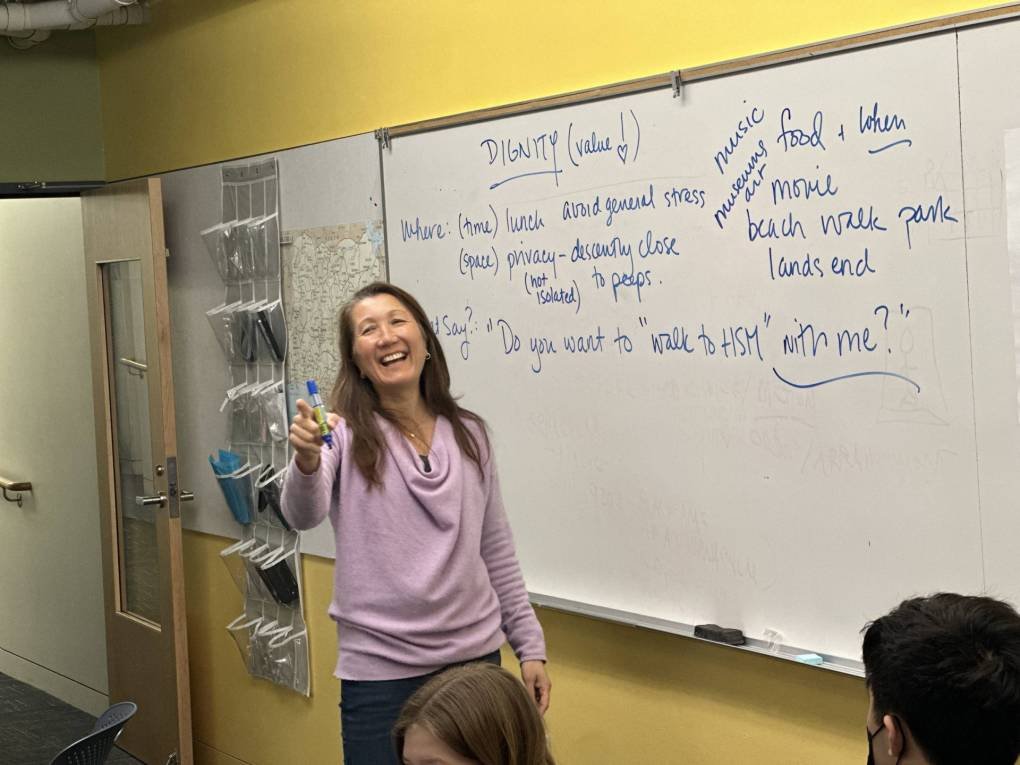For Valentine’s Day, we sat down with our faculty director to talk about love and his research, and specifically, what parents, schools, and communities can do to help young people build fulfilling relationships.
Read MoreRead the latest from Making Caring Common!
You’re in the right place for our media coverage, blog posts, and event information. Our work spans a range of topics, all connected by our commitment to elevate caring and concern for the common good at school, at home, and in our communities. You can review what’s new below or use the dropdowns to sort by topic and category.
Be sure to join our email list and connect with us on Facebook, LinkedIn, and Instagram, to stay current with Making Caring Common’s news and updates. If you’re a member of the media, please visit our Media Room.
Sort by topic
- Access and Equity
- Bias
- Bridging
- Building Connection
- Bullying
- COVID
- CSN
- Caring and Empathy
- College Admission
- Consent
- K-12
- Loneliness
- Mental Health
- Misogyny and Sexual Harassment
- Moral and Ethical Development
- Parenting
- Purpose and Meaning
- Romantic Relationships
- School Culture and Climate
- School Integration
- Social-Emotional Learning
- State of Caring
- Turning the Tide
- Voter Mobilization and Civic Education
- Youth Advisory Board
Sort by category
Consent education can help teens have better romantic relationships and can even help schools create a culture of empathy and inclusion. This Mind/Shift piece zooms in on one educator’s experience and cites MCC’s romantic relationships report.
Read MoreWhether your teen is swooning, heartbroken, or not yet experiencing romantic feelings for another person, Valentine's Day is an opportunity to engage them in a conversation about the meaning of love and romantic relationships. Here are five questions about love for parents and teens to discuss together.
Read MoreParenting in the digital age means having difficult conversations with kids—often before adults are prepared for these conversations. This webinar from our friends at Common Sense Media examines kids’ access to online pornography and highlights some of MCC’s related work. Panelists include author Peggy Orenstein, Dolly Klock, MD, Dr. Supreet Mann, and Edward Spector, PsyD.
Read MoreDid you know that September is sexual health month?
The Philadelphia Inquirer featured our research in this article discussing how young people are often looking for more information about how to create and sustain healthy romantic relationships.
1 in 4 teens think it’s okay to breakup by changing your social media status to “single,” according to a Pew Research Center report from 2015. In this Washington Post piece, MCC's Rick Weissbourd "calls breakups a 'very powerful source of ethical education,' a chance for teens to reflect on their responsibilities to other people."
Read MoreIn this piece for GQ, Eliza Brooke highlights educators who are taking a more holistic approach sex and relationship education and talks to MCC’s Rick Weissbourd about love.
Read MoreKevin Ballen spoke with Rick Weissbourd for Harvard Political Review about love and relationships.
Read MoreIn this piece in Quartzy, Sarah Todd speaks with Making Caring Common’s Rick Weissbourd about sex and relationships: “In terms of human flourishing, there’s nothing more important we can do to than help young people prepare to love.”
Read MoreIn this piece in The Conversation, Jordan Long cites Making Caring Common’s research on when (and if) parents talk to their kids about sex and relationships: “Although parents can play a powerful role in a child’s sexual socialization, a Harvard Graduate School of Education report found that roughly 50 per cent of parents express uneasiness when attempting to discuss sex with their children. More than 40 per cent of parents don’t discuss sex with their children until after they are sexually active.”
Read MoreIn this piece in HGSE’s Usable Knowledge by Grace Tatter, Rick Weissbourd says, “It’s so critical that kids are able to undertake this work of learning to love somebody else. They’re not going to be able to do it unless we get them on the road and are willing to engage in thoughtful conversations.”
Read MoreIn this piece in The New York Times by Lisa Damour, Rick Weissbourd explains that the first forays into sexual activity are often “overloaded with expectations as well as worries about performance.” Making Caring Common’s report The Talk is also cited.
Read MoreAs parents and caregivers, we must do better to prevent children and youth from harming or being harmed, and to help them become caring, humane people. We have tremendous power to shape their understanding of assault and consent, and to be part of the solution to this destructive epidemic. In this article in The Washington Post, MCC leaders Rick Weissbourd and Alison Cashin offer five guideposts to help parents begin these essential conversations.
Read MoreIn this piece in The Wall Street Journal, Making Caring Common’s report The Talk is cited. Difficult conversations about sex and consent have become even more complex — but here’s how dad’s can persist.
Read MoreIn this Washington Post article, Making Caring Common’s research is cited: most parents don’t talk to their boys or girls about making sure that their partner wants to have sex, not pressuring someone into sex, not having sex with someone who is incapacitated and other key aspects of consent. Parents may have “the talk” with their kids, but it’s often much more focused on preventing pregnancy and STDs than on preventing assault.
Read MoreIn honor of Valentine's Day, we asked our wonderful Youth Advisory Board about love. Here's what they had to say.
Read More
















